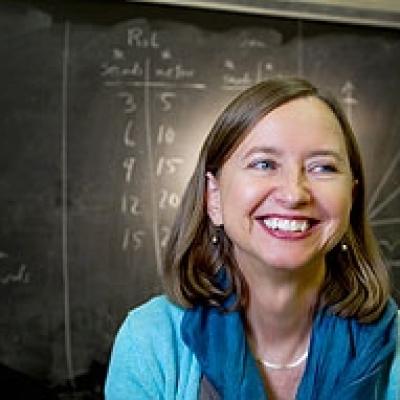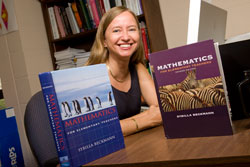
Meet Dr. Sybilla Beckmann-Kazez
Josiah Meigs Distinguished Teaching Professor
When Sybilla Beckmann was asked six years ago to participate in the Writing Intensive Program, she knew instantly that it made a lot of sense for the classes she teaches. Sybilla’s students are learning to teach math in elementary and middle-school, where it’s essential that they be able to explain, describe, and discuss mathematical concepts with their own students. The WIP is a “perfect fit” with math education, she says, because it’s not enough to be able merely to solve problems; it’s also critical to thoroughly understand mathematical principles and communicate them to students in terms they can understand. Thinking through their ideas on paper enables them to do both while elevating course content to a higher level, making students more conscious of what it means to really know something.
Sybilla also saw the WIP as an excellent opportunity for her graduate students. She says the WIP TAs she’s worked with are “uniformly positive” about their experiences with the program, and they especially value getting to interact with their peers in other disciplines. “It’s sort of magic,” she says, to work with such enthusiastic and conscientious TAs, and she strongly encourages more of her graduate students to apply for the program. Not only does it strengthen their teaching, but they gain a distinct advantage when they go on the job market and learn a great deal from WIP TAs in other disciplines.
The WIP is a “perfect fit” with math education, she says, because it’s not enough to be able merely to solve problems; it’s also critical to thoroughly understand mathematical principles and communicate them to students in terms they can understand.

As for how the WIP has influenced her own teaching practices, Sybilla says it’s made her much more conscious of eliciting writing as a means of thinking and a mechanism to learn. When students are reminded of the WIP goals for the course, she says they put a lot more thought into how they express concepts and realize that it’s not simply about getting “the right answer.”
Having experimented with a number of WIP courses, Sybilla has discovered that the program works slightly better with arithmetic than geometry, which she attributes to basic differences in course content. She continues to look for new ways to implement WIP principles and has plans underway to develop a large writing-intensive lecture course. She advises faculty who already include writing as part of their teaching to give WIP a try–as long as it works with the philosophy, goals, and methods of the course. She encourages faculty to think also in terms of offering this unique opportunity to their graduate students.

Wish List
To make the WIP more widely available—but not so big it doesn’t continue to be well-managed! It’s working very well now, she says, and she wouldn’t want it to lose its magic.